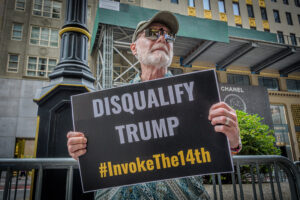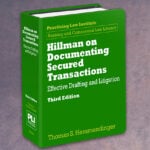FedSoc Law Professors Don't Think Trump Should Be Legally Allowed To Run For President
If only someone would do something about that...

(Photo by Erik McGregor/LightRocket via Getty Images)
Two conservative law professors, William Baude of the University of Chicago and Michael Stokes Paulsen of the University of St. Thomas, set out to answer the important legal academic question of our time: is Donald Tump eligible to run for elected office? Because of that whole insurrection thing. Baude told Adam Liptak of the New York Times they went in to the research as blank slates:
“When we started out, neither of us was sure what the answer was,” Professor Baude said. “People were talking about this provision of the Constitution. We thought: ‘We’re constitutional scholars, and this is an important constitutional question. We ought to figure out what’s really going on here.’ And the more we dug into it, the more we realized that we had something to add.”

Survey Results: A Perspective On The Private Markets
And what the professors found was pretty damn clear:
“Donald Trump cannot be president — cannot run for president, cannot become president, cannot hold office — unless two-thirds of Congress decides to grant him amnesty for his conduct on Jan. 6.”
That’s because of Section Three of the 14th Amendment’s prohibition of any person who took an oath to support the U.S. Constitution and then “engaged in insurrection or rebellion against the same, or given aid or comfort to the enemies thereof” from holding any government office.
They continue with their findings in the University of Pennsylvania Law Review, “The bottom line is that Donald Trump both ‘engaged in’ ‘insurrection or rebellion’ and gave ‘aid or comfort’ to others engaging in such conduct, within the original meaning of those terms as employed in Section 3 of the 14th Amendment.”
Sponsored

Clio Users: New Ways To Add Value To Your Practice!

Survey Results: A Perspective On The Private Markets

LawPay Pro Offers Upgraded Time And Billing Essentials

LawPay Pro Offers Upgraded Time And Billing Essentials
So what does this mean for the Republican frontrunner for the 2024 nomination for president? As a practical matter, probably nothing. But the authors note, “Section 3’s disqualification rule may and must be followed — applied, honored, obeyed, enforced, carried out — by anyone whose job it is to figure out whether someone is legally qualified to office.” This is on election administrators then? That state-by-state process is much more likely to devolve into a political question than a legal analysis of the 14th Amendment.
But perhaps the Supreme Court can intervene:
But the scope and depth of the article may encourage and undergird lawsuits from other candidates and ordinary voters arguing that the Constitution makes him ineligible for office.
“There are many ways that this could become a lawsuit presenting a vital constitutional issue that potentially the Supreme Court would want to hear and decide,” Professor Paulsen said.
HAHAHAHA! I mean, sure they *could.* But I’m not holding my breath for this Supreme Court with this particular 6-3 ideological split to do much about it.
Sponsored

The Digital Transformation Imperative


Documenting Secured Transactions: A New Guide For Practitioners
 Kathryn Rubino is a Senior Editor at Above the Law, host of The Jabot podcast, and co-host of Thinking Like A Lawyer. AtL tipsters are the best, so please connect with her. Feel free to email her with any tips, questions, or comments and follow her on Twitter @Kathryn1 or Mastodon @Kathryn1@mastodon.social.
Kathryn Rubino is a Senior Editor at Above the Law, host of The Jabot podcast, and co-host of Thinking Like A Lawyer. AtL tipsters are the best, so please connect with her. Feel free to email her with any tips, questions, or comments and follow her on Twitter @Kathryn1 or Mastodon @Kathryn1@mastodon.social.







